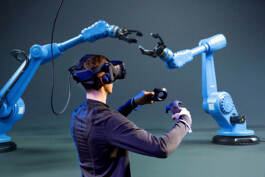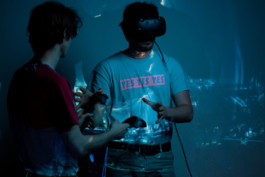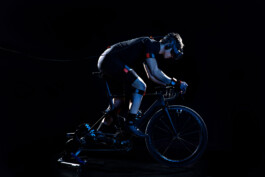Research
Focus 1 — Humans and Technology.
The Human Factors Lab at the Department of Design at Darmstadt University of Applied Sciences aims to explore digital technologies and their application in human needs situations. In 2019, I started setting up the innovation lab together with Tino Melzer. The focus of the lab lies in the research and application of design in the fields of cognitive and physical ergonomics, human factors, usability engineering, user experience design and human-robot collaboration.
Additional research projects on the following topics are in planning: The impact of digital tools on design processes, the importance of analog skills for design work, the qualitative assessment of computer-controlled design processes and the design of human-friendly applications of digital technology.
The Human Factors Lab serves to expand on teaching content in the area of human-technology interaction and human factors. In addition, it functions as a cooperation platform between science and industry. The spectrum of applications ranges from ergonomic analysis and the optimization of industrial workplaces to usability engineering in product development and CAD simulation in architecture and industrial design (space, urban planning and object).
Today, hardware and software equipment enables the virtual testing of designs and applications in the development phase. With the help of digital sensors and virtual 3D visualizations, staff and students work on real-time prototypes and modeling in mixed reality.
The Human Factors Lab offers research and project collaborations with industry. If you are interested in collaborating in the spectrum of workplace ergonomics, usability engineering or mixed reality simulation for product development and architecture, please feel free to contact me.
Focus 2 — Design in the Organization.
Design is a discipline that is often associated initially with surface design. While this is not inaccurate, that understanding falls short. Design often refers to the shaping of products, communication or user experiences, but it can also be applied to systems, processes and thought models.
The design thinking required for this is a competence – among others, an organizational one – that has become essential in a world in which technological developments and the needs of users are difficult to predict.
In this respect, design can contribute significantly to the development of innovations, customer-oriented processes, as well as the strategic orientation of companies and their organizational change. To accomplish this in business practice, design cannot be reduced to a form-giving function in the context of products and services.
My further research interest thus focuses on the question of what contribution design makes in companies today beyond shaping and how this is managed as well as the question as to whether archetypal management patterns that can serve as structural models for design leadership can be devised.


